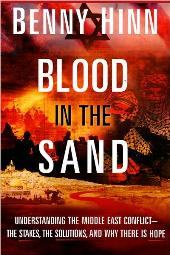The Fig Tree Is in Bloom
Three Significant Prophecies
I have been told that for centuries, Jewish rabbis have been waiting for the fulfillment of three Old Testament passages they believe point to the Messiah’s coming. The first two have already occurred, and the third is taking place right before our eyes.
1. Traffic in the streets of Jerusalem. Nahum wrote of a time after Israel would be scattered and persecuted, when “the emptiers have emptied them out and ruined their vine branches” (Nah. 2:2). He saw the day when “the chariots come with flaming torches in the day of His preparation … they jostle one another in the broad roads; they seem like torches, they run like the lightning” (vv. 3-4).
The prophet saw cars in Jerusalem and did not know how to properly describe them-vehicles speeding in the streets of the city that he called “broad roads.” These wide roads didn’t exist in the prophet’s day, but they certainly do now!
2. The Israeli Air Force of 1967. Isaiah spoke of a day to come: “Like birds flying about, so will the Lord of hosts defend Jerusalem. Defending, He will also deliver it; passing over, He will preserve it” (Is. 31:5).
In 1948 the Israeli Air Force was still a fledgling force. At the time they had only a hodgepodge collection of donated civilian aircraft, totally inadequate for battle against modern fighter jets.
So they used their creativity. Pilots used to throw soda bottles out of their planes to create a whistling sound. The enemy thought a bomb was approaching and would run for their lives! But in the 1967 war, the “birds” mentioned in Isaiah were dominating the skies and defending Jerusalem.
3. The desert must bloom. Isaiah prophesied: “The wilderness and the wasteland shall be glad for them, and the desert shall rejoice and blossom as the rose; it shall blossom abundantly and rejoice, even with joy and singing. The glory of Lebanon shall be given to it” (Is. 35:1-2).
Before 1948, Israel was practically nothing but desert and desolation. During the Ottoman Empire, nearly every tree in the land was cut down. Yet every time I return to Israel I am amazed at the abundance of palms, banana trees and flowers growing profusely throughout the region.
As a boy, I remember going to southern Israel into the Negev. Most of what I saw was unproductive land that was practically uninhabitable.
But on a recent journey I returned to the same area and was astonished by what I saw-acres of crops as far as the eye could see and communities springing up everywhere. God was speaking of Israel when He declared:
” ‘So they will say, “This land that was desolate has become like the garden of Eden; and the wasted, desolate, and ruined cities are now fortified and inhabited” ‘” (Ezek. 36:35).
Many Christians are planting trees in Israel. Our own ministry has been involved in planting olive trees all over the country; we even have our own orchard. We as Christians are a part of fulfilling this prophecy.
What were once arid sand dunes are now rich and fertile farmlands, not only feeding Israel’s own people but also exporting fruits and vegetables to the world. Israel’s economy now surpasses that of many European countries.
It is only by a miracle of God that this nation is still alive. As Christians, we know that the Messiah came to the earth the first time 2,000 years ago, yet the Jewish people are still looking for Him. According to Scripture He will return again, and Israel will believe.
On a journey back to my homeland recently, I was near the Western Wall in Jerusalem where many people were praying. I asked a rabbi standing there, “Do you believe the Messiah is coming?”
“He has to! It is time,” he answered.
One famous song played all the time in Israel is “Where Is the Messiah?” The Jewish people are looking for the Messiah and praying now more than ever for their total deliverance.
And when Christ returns the second time, the greatest revival the world has ever seen will break out in this land that is so precious to Him.
Benny Hinn is an evangelist, Bible teacher and author of numerous books, including his newest, Blood in the Sand (FrontLine), from which this article is adapted. To purchase the book, click here.















































